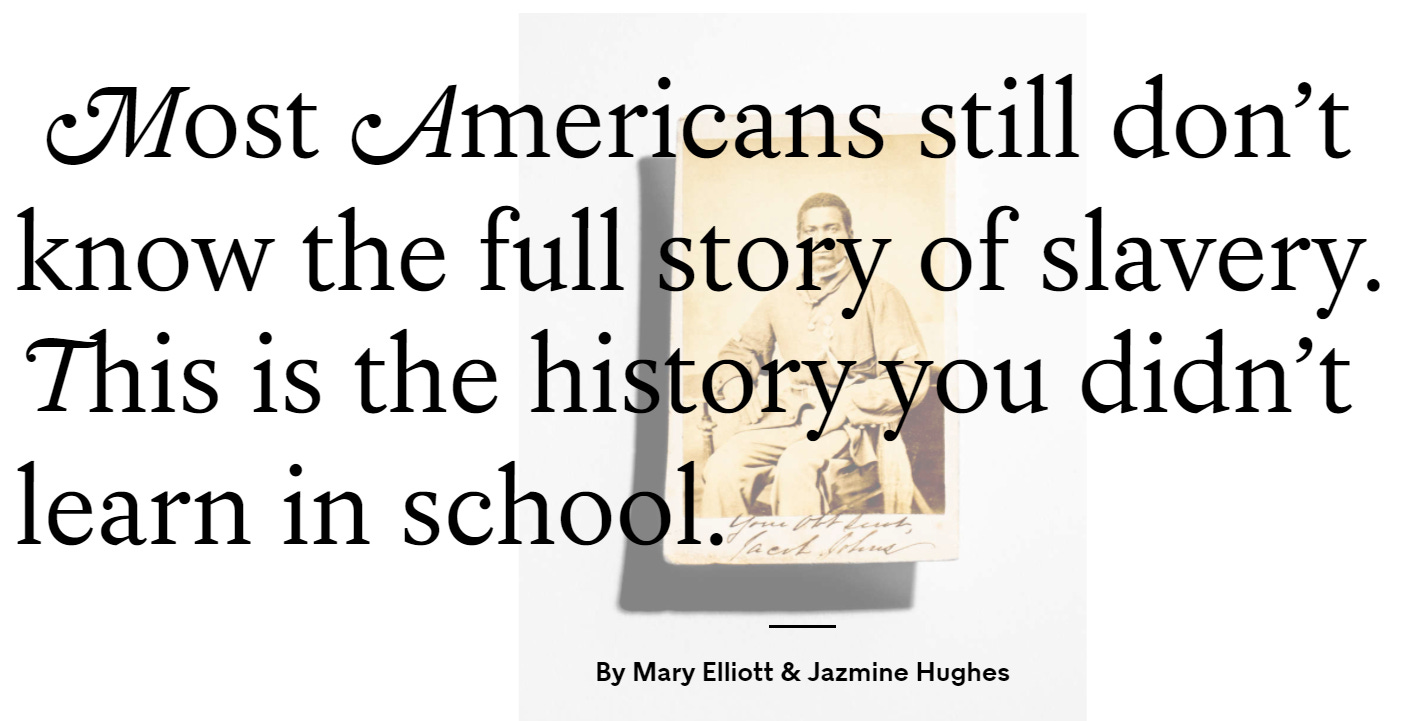The Problem with the 1619 Project Isn't Accuracy, It's Triviality
the strong claim is wrong and the weak claim is banal
Sharing my thoughts on the 1619 Project has been, since the beginning of this newsletter, one of the most requested posts from readers. I’m not a historian so I don’t feel that me addressing the underlying historical facts would be useful. But I will briefly lay out why I think the 1619 Project is probably unworthy of so much attention, both good and bad.
Here’s the essential point. The way the 1619 Project’s central claim is typically glossed is that the American revolution was “really about” slavery, with the Founders acting in the interests of maintaining and spreading and suborning slavery. The trouble here is that nothing in history is monocausal. There are no major world events that stem only from one thing, even a thing as big and capacious and complex as slavery. Everything in history, and certainly anything as multivariate as the American revolution, is the product of a vast number of influences. So if the claim is “slavery was the cause of the founding of the United States of America,” then yeah, the 1619 Project is wrong. That is not a constructive way to understand our history or history in general; it reflects a juvenile attachment to simplistic cause and effect in a universe where “cause” if diffuse, conflicting, and provisional. But I’m not sure that that’s a fair summary of 1619, as often as that has been proffered as one casually. Nothing I can find in the text itself says that slavery is the only cause of the revolution.
But that leads to other trouble. If the claim is instead “protecting the institution of slavery was vitally important to the founding and structure of the United States of America,” then that’s absolutely true. But it’s also not remotely novel; in fact I’d say that it’s trivial. The centrality of slavery to the founding of the United States has been widely discussed for decades and most academic historians of the relevant periods assume it as a matter of fact. These ideas are well worn. To pick an obvious example, A People’s History of the United States was published 40 years ago. So the whole rationale for the project, its elevator pitch, is merely standard liberal history. Which makes it unworthy of conservative freakouts but also of a Pulitzer Prize. The text itself says that we should put slavery at “the very center of the United States' national narrative.” Well, OK. But wasn’t it already there?
The 1619 Project panic, critical race theory, the recent debate about whether people are/were taught in school that slavery was bad - it all proceeds from the same misconception, one shared by many on left and right alike, that what people are taught about history becomes what they know about history and that what they know about history has some material impact on how they think and act and vote. I don’t think any of those things are true. It’s the sort of thing you start to believe when you’re quietly resigned to the idea that you can’t actually solve real problems directly with the application of power. So you tell the universe, “But at least we understand! We, the moral vanguard of history….”





I think you're allowing a little conceptual slippage here, though. Slavery was "vitally important to the founding and structure" of the U.S. in the sense that it was a key issue to be dealt with in constructing the Constitution. But it's just not true that slavery was a major CAUSAL factor of the Revolution, which is how Hannah-Jones framed it. ("One critical reason the colonists declared their independence from Britain was because they wanted to protect the institution of slavery in the colonies.... At the time there were growing calls to abolish slavery throughout the British Empire, which would have badly damaged the economies of colonies in both North and South.")
The problem isn't that she called it the sole factor. It's that, according to the period-expert history professor the Times hired to fact check 1619 (and then ignored), it wasn't a meaningful cause at all:
https://www.politico.com/news/magazine/2020/03/06/1619-project-new-york-times-mistake-122248
"More importantly for Hannah-Jones’ argument, slavery in the Colonies faced no immediate threat from Great Britain, so colonists wouldn’t have needed to secede to protect it. It’s true that in 1772, the famous Somerset case ended slavery in England and Wales, but it had no impact on Britain’s Caribbean colonies, where the vast majority of black people enslaved by the British labored and died, or in the North American Colonies. It took 60 more years for the British government to finally end slavery in its Caribbean colonies, and when it happened, it was in part because a series of slave rebellions in the British Caribbean in the early 19th century made protecting slavery there an increasingly expensive proposition."
In other words, the strong claim is wrong, but it hasn't been misrepresented. That was her actual claim!
And I just don't agree that historical education has no impact on how people act and vote. People routinely marshal historical arguments and precedents in order to justify a particular political outcome, and as "RC" points out, works of popular history especially sink in and affect people's thinking. (Zinn himself was a pretty sloppy historian -- but how many leftists were born from his work?)
The most extensive rebuttal to "1619" is that published by the World Socialist Website which interviewed many historians and published a series of great essays. It was not, as I've read, "a conservative backlash" that gave us this critique.
Extremely impressive and you should take time, please, to peruse it.
https://www.wsws.org/en/topics/event/1619